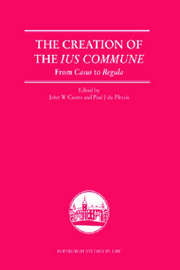Book contents
- Frontmatter
- Contents
- Preface
- List of Contributors
- List of Abbreviations
- Introduction
- 1 The Sources of Medieval Learned Law
- 2 The Infrastructure of the Early Ius Commune: The Formation of Regulae, or its Failure
- 3 Ius Quaerens Intellectum: The Method of the Medieval Civilians
- 4 Medieval Family and Marriage Law: From Actions of Status to Legal Doctrine
- 5 The Roman Concept of Ownership and the Medieval Doctrine of Dominium Utile
- 6 Succession to Fiefs: A Ius Commune Feudorum?
- 7 Towards the Medieval Law of Hypothec
- 8 The Ignorant Seller's Liability for Latent Defects: One Regula or Various Sets of Rules?
- 9 The Glossators' Monetary Law
- 10 Citations and the Construction of Procedural Law in the Ius Commune
- 11 Doctoribus bona dona danda sunt: Actions to Recover Unpaid Legal Fees
- Index
Introduction
Published online by Cambridge University Press: 12 September 2012
- Frontmatter
- Contents
- Preface
- List of Contributors
- List of Abbreviations
- Introduction
- 1 The Sources of Medieval Learned Law
- 2 The Infrastructure of the Early Ius Commune: The Formation of Regulae, or its Failure
- 3 Ius Quaerens Intellectum: The Method of the Medieval Civilians
- 4 Medieval Family and Marriage Law: From Actions of Status to Legal Doctrine
- 5 The Roman Concept of Ownership and the Medieval Doctrine of Dominium Utile
- 6 Succession to Fiefs: A Ius Commune Feudorum?
- 7 Towards the Medieval Law of Hypothec
- 8 The Ignorant Seller's Liability for Latent Defects: One Regula or Various Sets of Rules?
- 9 The Glossators' Monetary Law
- 10 Citations and the Construction of Procedural Law in the Ius Commune
- 11 Doctoribus bona dona danda sunt: Actions to Recover Unpaid Legal Fees
- Index
Summary
The jurist Paul wrote: “The law may not be derived from a rule, but a rule must arise from the law as it is.” This fragment is found in D 50.17, entitled De diversis regulis iuris antiqui, which consists of 211 such rules or regulae culled from the works of jurists of the classical era. The quotation from Paul emphasises the extent to which the Roman lawyers thought that regulae were extrapolated from cases, casus or causae. When the medieval jurists were confronted by the Roman texts, with their concrete discussion of particular cases, they looked at this title and this text for guidance and started to develop the casuistic Roman jurisprudence found in the Digest, Code, and Novels into more general rules or regulae. In the English-language literature Peter Stein explored this in his 1966 study, which focused on the general trends. Stein thereby contributed to a larger, well-known narrative about the development of a pan-European ius commune or universal common law, ca 1100-1400.
Though there are antecedents, this grand narrative can for our purposes be dated to the epochal and brilliant work of Savigny on the medieval rediscovery of Roman law. What made Savigny's study particularly valuable was his discussion of individual jurists and their works, bringing to light once more the significance of these early scholars. He did not especially focus on the juristic content of their labours.
- Type
- Chapter
- Information
- The Creation of the Ius CommuneFrom Casus to Regula, pp. 1 - 6Publisher: Edinburgh University PressPrint publication year: 2010



